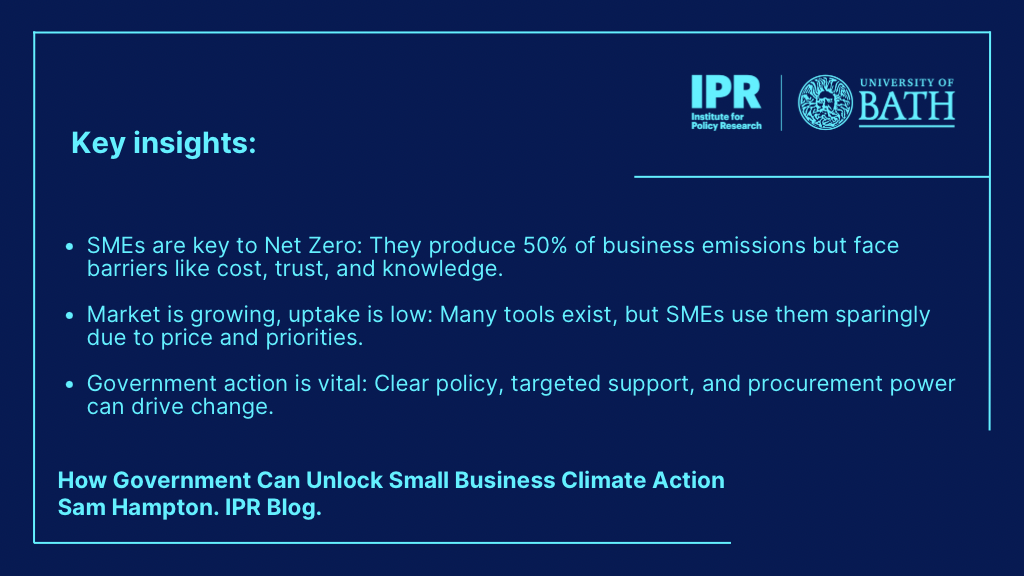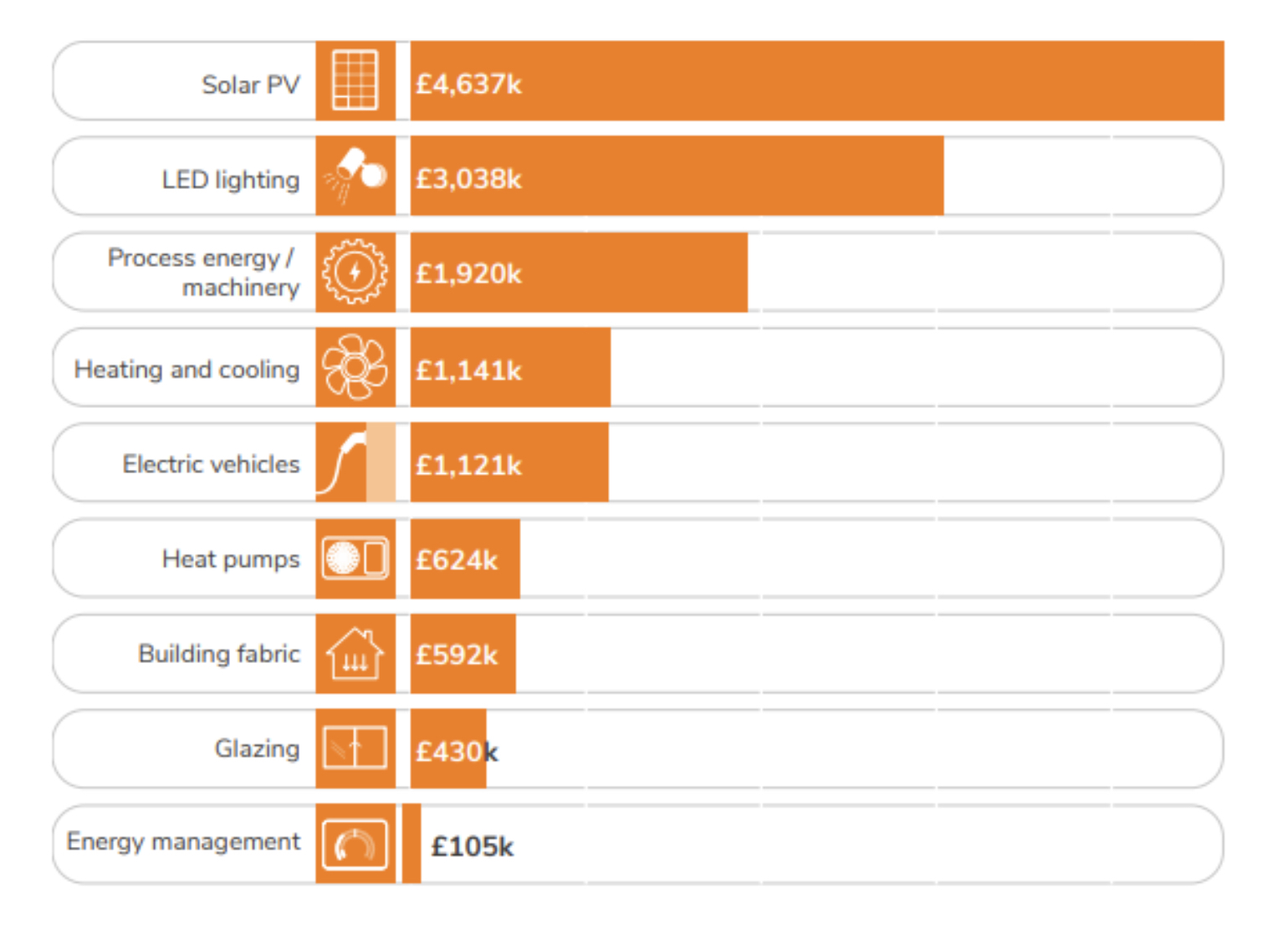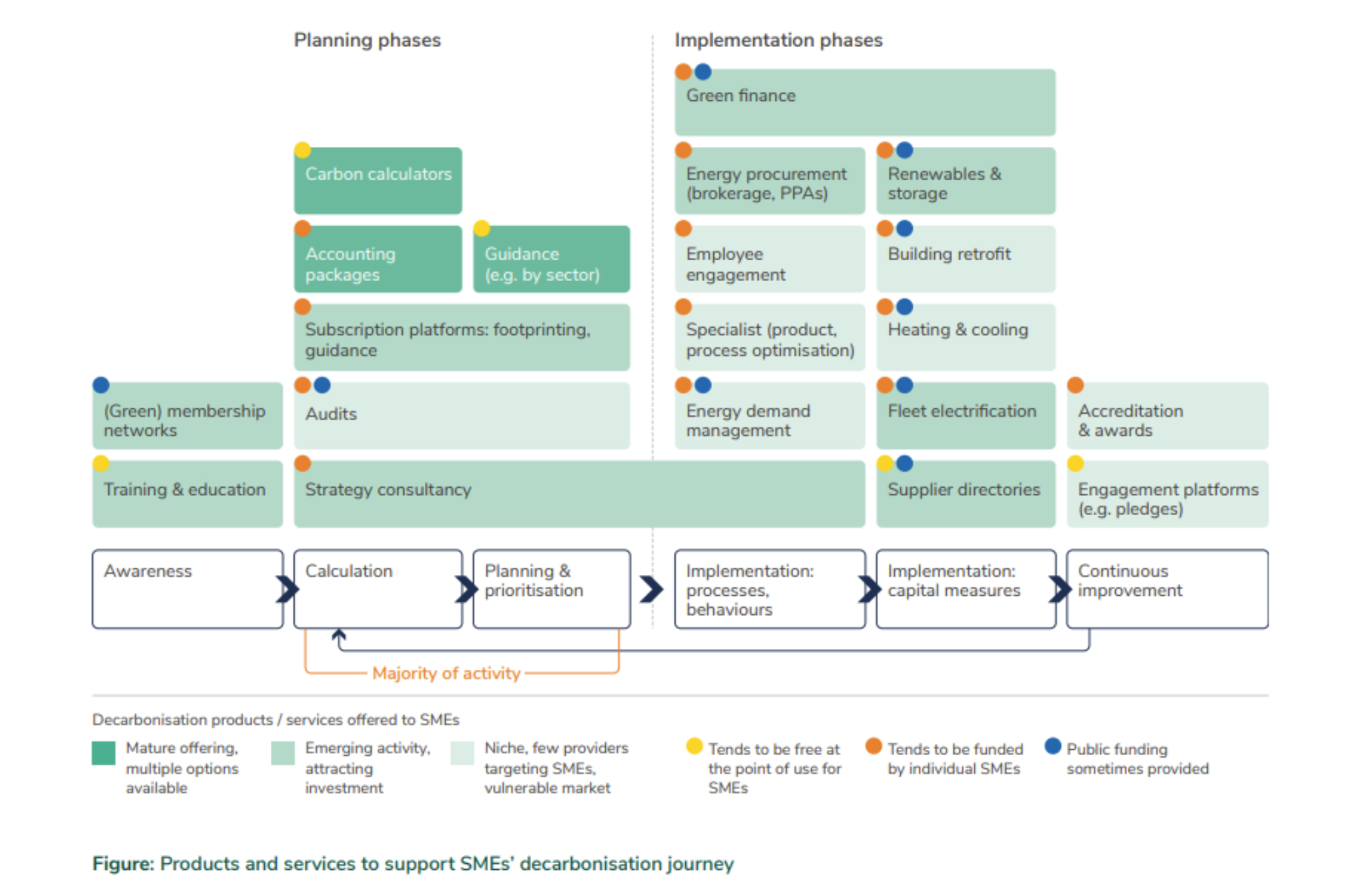 Small and medium-sized enterprises (SMEs) produce around half of the UK’s business-related emissions, making them critical to achieving Net Zero. Despite growing private sector solutions, barriers like finance, trust, and policy uncertainty persist. Sam Hampton explores how strategic government action can unlock SME climate leadership and accelerate the transition to a low-carbon economy.
Small and medium-sized enterprises (SMEs) produce around half of the UK’s business-related emissions, making them critical to achieving Net Zero. Despite growing private sector solutions, barriers like finance, trust, and policy uncertainty persist. Sam Hampton explores how strategic government action can unlock SME climate leadership and accelerate the transition to a low-carbon economy.
Sam Hampton is a Researcher in Environmental Geography at the University of Oxford and a Research Fellow in the Department of Psychology at the University of Bath. His latest policy brief is available here.
Small and medium-sized enterprises are responsible for roughly half of the UK's business-related greenhouse gas emissions, yet they face persistent barriers to cutting their carbon footprint. Our new research, conducted in partnership with the Department for Energy Security and Net Zero (DESNZ) and funded by the Research England Policy Support Fund, reveals both unprecedented private sector momentum and critical gaps that only government can address.
The stakes could not be higher. The UK's 5.5 million SMEs collectively account for half of business energy use, making their decarbonisation essential to achieving Net Zero by 2050. Recent energy price crises have created both challenges and opportunities: while many businesses struggle with soaring costs, the business case for clean energy investments has never been stronger.
A Market in Rapid Transformation
Our six-month study, involving interviews with 30 stakeholders across the private, public, and non-profit sectors, uncovered a dramatically evolving landscape. We mapped 20 distinct products and services now available to support SME decarbonisation—from basic carbon calculators to comprehensive sustainability platforms offering ongoing monitoring and improvement.
The growth is remarkable. There are over 270 carbon accounting providers targeting SMEs, while major accounting software companies like Sage are integrating emissions tracking into standard business packages. Artificial intelligence is lowering entry barriers by automating carbon calculations and generating tailored recommendations for different business types.
Supply chain pressure is proving a game-changer. Large organisations increasingly require carbon reporting from SME suppliers, creating self-sustaining demand for measurement and reporting services. Government's own procurement policy, requiring carbon reduction plans for contracts over £5 million, has cascaded throughout supply chains. Recent research by the Federation of Small Businesses found 56% of members had been asked to provide emissions data to companies they supply to.
The Reality Check
Despite this supply-side explosion, actual SME demand for products and services to reduce emissions remains limited. While 78% of respondents to an SME Climate Hub survey calculate their emissions, only 17% pay for carbon accounting services—most rely on free tools. Many decarbonisation plans, once developed, gather dust as other business priorities take precedence.
The market faces several critical weaknesses. Trust remains a significant barrier, with SMEs cautious about service providers who might prioritise selling products over tailored solutions. Quality control is inconsistent—with no universal standards for carbon accounting, the sector resembles what one provider described as "the Wild West."
Perhaps most fundamentally, UK SMEs exhibit pronounced reluctance to take on debt. Only 11% use loans to finance decarbonisation, preferring internal funding even when preferential green finance is available. This reflects elevated interest rates, economic uncertainty, and a cautious approach shaped by pandemic-era borrowing.
Strategic Government Roles

The creation of the SME Decarbonisation Team within DESNZ represents a watershed moment, signalling recognition of SMEs' unique challenges in the Net Zero transition. Our research suggests government must now play multiple strategic roles rather than simply funding grants and audits.
Targeted intervention is crucial. While mature technologies like LED lighting and increasingly solar photovoltaics can rely on private investment, government should focus subsidies on less mature, higher-impact technologies such as heat pumps and comprehensive building retrofits. Analysis of £15 million in grants distributed by eight regional projects shows solar PV and LED lighting dominated funding, but as these markets mature, public money is better directed elsewhere.

Policy certainty emerges as critical. Stakeholders consistently highlighted how policy uncertainty creates hesitancy among both SMEs and service providers. Clear, long-term signals about future standards and requirements enable businesses and providers to plan and invest with confidence.
Leveraging procurement power offers enormous potential. The NHS procurement model, which links carbon reporting to ongoing emissions reductions rather than mere tick-box exercises, provides a template for extending across the public sector.
Sector-Specific Solutions
Our research challenges the traditional place-based approach to business support. While local networks remain important, many SMEs—particularly those in specialised markets or integrated into national supply chains—may find sectoral connections more relevant than geographical ones.
DESNZ's recent pilot targeting the hospitality sector exemplifies this approach. By working with Zero Carbon Services to trial support tools with 600 SMEs, government is testing what works for businesses facing similar operational challenges. This "test and learn" methodology could be replicated across other energy-intensive or vulnerable sectors.
The Path Forward
Government's role is evolving from direct provider to strategic convenor and market shaper. Rather than competing with private sector activity, well-designed public intervention can stimulate additional private investment by reducing risk and signalling demand.
Critically, fears of "crowding out" private investment appear largely unfounded. Providers consistently told us that government support helps rather than hinders their work, creating momentum and validation for emerging markets.
The creation of the DESNZ SME Decarbonisation Team represents the right institutional response, but it needs sustained resources and ministerial support. Success requires embedding decarbonisation into mainstream business support, building on trusted networks rather than creating new initiatives from scratch, and ensuring all publicly funded programmes generate robust data for continuous learning.
SME decarbonisation is not just about environmental targets—it is about ensuring the resilience and competitiveness of the business sector that forms the backbone of the UK economy. By adopting a more agile, evidence-led approach that leverages the strengths of all actors, government can unlock the full potential of Britain's small businesses in the transition to Net Zero.
The private sector momentum is real, but government leadership remains indispensable. The question is not whether to intervene, but how to intervene most effectively in partnership with the market forces already transforming small business climate action.
All articles posted on this blog give the views of the author(s), and not the position of the IPR, nor of the University of Bath.
Respond





